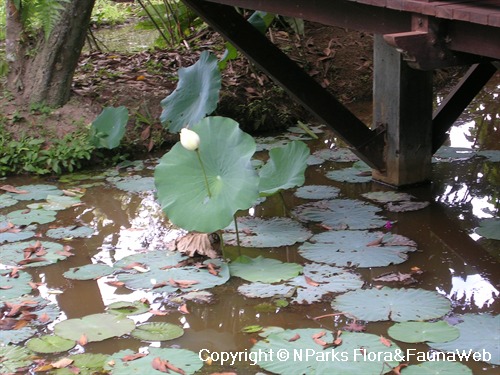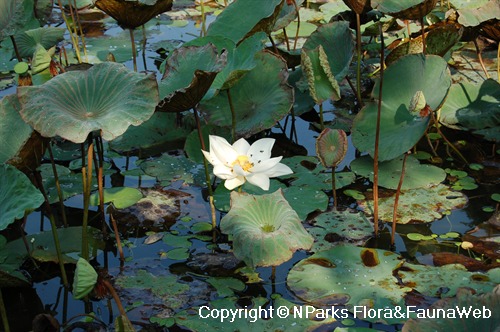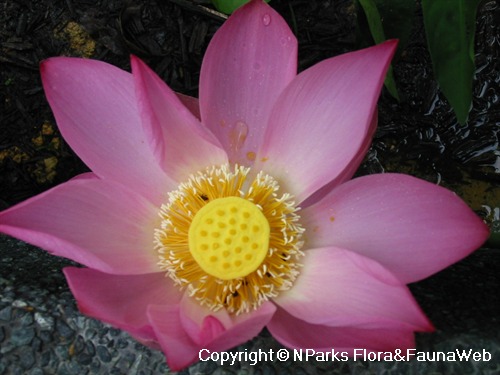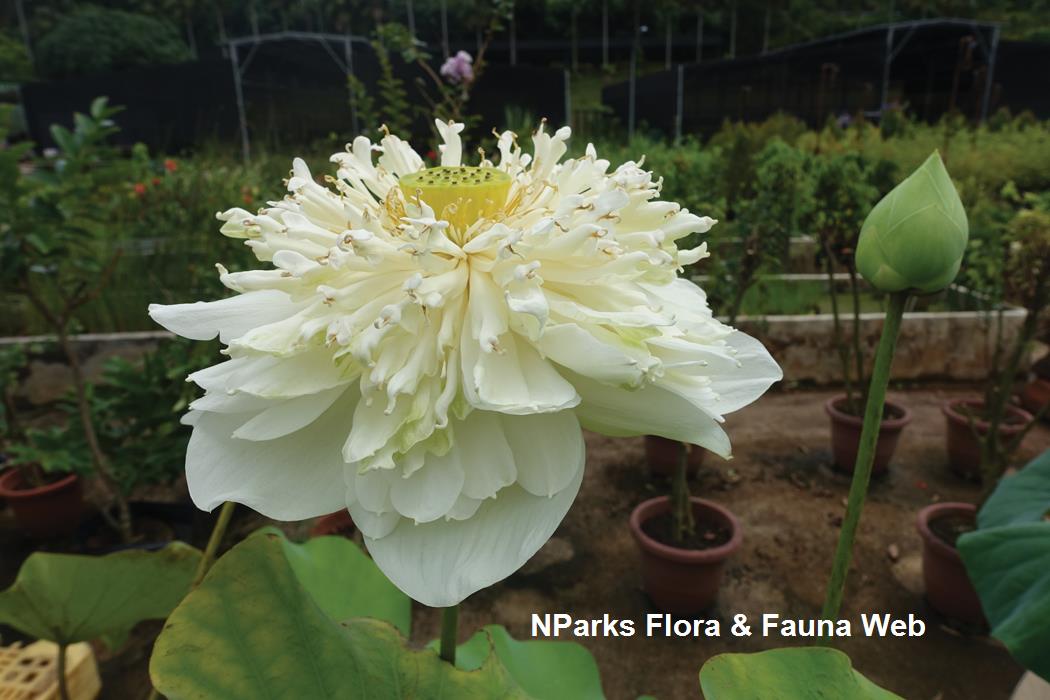
Back
Nelumbo nucifera 'Alba'
| Family Name: | Nelumbonaceae |
| Synonyms: | Nelumbo caspica |
| Common Name: | Lotus, Indian lotus, 莲, 荷花 |
Name
Classifications and Characteristics
| Plant Division | Angiosperms (Flowering Seed Plants) (Dicotyledon) |
|---|---|
| Plant Growth Form | Shrub |
| Lifespan (in Singapore) | Perennial |
| Mode of Nutrition | Autotrophic |
Biogeography
| Native Distribution | Tropical Asia and northeast Australia |
|---|---|
| Native Habitat | Aquatic (Freshwater Pond / Lake / River) |
| Preferred Climate Zone | Tropical |
| Local Conservation Status | Non-native |
Description and Ethnobotany
| Ethnobotanical Uses | Edible Plant Parts : Edible Leaves, Edible Flowers, Edible Stems, Edible Seeds, Edible Storage Organs Food (Fruit or Vegetable): The young leaves, leaf stalks and flowers are eaten as vegetables. The "roots" (rhizomes) are used as a vegetable in soups, stir-fried. Young lotus stems are used as a salad ingredient. The lotus seeds (called lian zi in Chinese) can be eaten raw or dried and popped like popcorn. They can be boiled with dried longans to make a dessert., or made into a paste. Lotus seed paste is the most common ingredients used in pastries such as mooncake and rice flour pudding. The large leaves are used to wrap food such as in lotus rice. (Herb or Spice): The stamens are dried and made in to herbal tea called lianhua cha in Chinese. Medicinal: The entire plant is used medicinally the Chinese. The plant itself is prescribed as an antidote for mushroom poisoning. The rhizomes or leaves are used with other herbs to treat sunstroke, fever, diarrhoea, dysentery, dizziness, vomiting of blood, hemorrhoids. The embryonic seeds for high fever, cholera (Chinese), nervous disorders and insomnia; the seeds to stop vomiting, relieve indigestion and diarrhoea or just as a tonic. The flower stalks are used for excessive bleeding from uterus. Seeds are used as tonic. Cut - Dried Flower: The distinctive dried seed heads are widely used for decorative purpose and for dried flower arrangement. |
|---|
Landscaping Features
| Desirable Plant Features | Ornamental Flowers, Fragrant (Flowers) |
|---|---|
| Landscape Uses | Pond / Lake / River |
| Thematic Landscaping | Water Garden |
Plant Care and Propagation
| Light Preference | Full Sun |
|---|---|
| Water Preference | Lots of Water |
| Plant Growth Rate | Moderate |
| Rootzone Tolerance | Waterlogged Soils |
| Transplanting Tolerance | Good |
| Propagation Method | Seed |
Foliar
| Mature Foliage Colour(s) | Green |
|---|---|
| Mature Foliage Texture(s) | Rough |
| Prominent Young Flush Colour(s) | Green |
| Foliar Type | Simple / Unifoliate |
| Leaf Area Index (LAI) for Green Plot Ratio | 4.5 (Shrub & Groundcover - Dicot) |
Floral (Angiosperm)
| Flower Colour(s) | White |
|---|---|
| Flower Location | Terminal |
Image Repository
Others
| Master ID | 964 |
|---|---|
| Species ID | 2258 |
| Flora Disclaimer | The information in this website has been compiled from reliable sources, such as reference works on medicinal plants. It is not a substitute for medical advice or treatment and NParks does not purport to provide any medical advice. Readers should always consult his/her physician before using or consuming a plant for medicinal purposes. |



